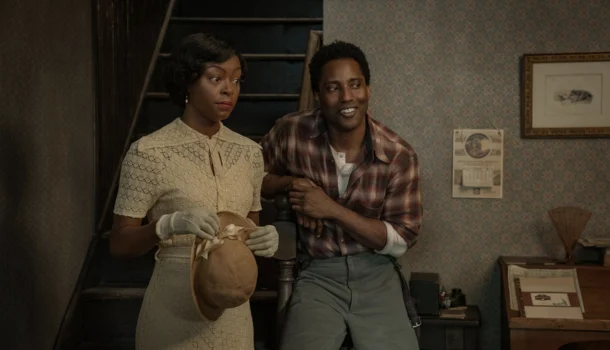There are no inert objects when history still pulses through their cracks. A piano — an inheritance of blood, pain, and resistance — becomes the spark in a battle between siblings whose pasts clash in opposing visions of the future. In “The Piano Lesson”, Malcolm Washington adapts August Wilson’s play with a gaze steeped in intimacy and intensity, crafting not merely a drama but an invocation. Produced by Denzel Washington and starring John David Washington and Charity Jordan, the film resists easy sentimentality: its strength lies in the moral tension that simmers between the desire to transcend the past and the urgency to preserve it.
At the gravitational center of the narrative is a piano carved with the faces and memories of a Black lineage marked by slavery and loss. For Boy Willie, selling it represents a chance to rewrite his own path by acquiring land that once belonged to his family’s oppressor. For Berniece, parting with it would sever her bond with those who came before — a betrayal of ancestral memory. Between them, the silence of the piano weighs more than any scream, harboring unhealed wounds and a truth that can only surface if someone dares to listen.
The tension reaches its peak when Doaker, portrayed with gravity by Samuel L. Jackson, reveals the piano’s origin: human lives bartered for music. The instrument’s wood, polished by grief and the craft of Papa Willie Boy, bears not only carvings — but absences. The faces etched into it are petrified witnesses of a time when love was mutilated by economic interest, and art was used as imposed solace by those who turned remembrance into ornament.
The act of carving family history into the piano, performed by a man forcibly separated from his own, takes on an almost liturgical dimension. It is artisanal resistance. Each figure carved becomes a silent scream, a pagan prayer rejecting erasure. Years later, when Boy Charles risks his life to reclaim the piano, he doesn’t steal a material object — he asserts symbolic ownership over denied dignity. This act of defiance travels across generations until it reaches Berniece — heir to an instrument that belongs not only to her, but to all those whose stories were stolen.
Berniece’s fear of playing the piano is more symbolic than superstitious. To play is to relive. And to relive demands pain, courage, and surrender. Keeping the piano closed means preserving trauma in its raw state. But silent mourning doesn’t heal — it only delays. The narrative leads the protagonist to the moment where she must break the seal of the past and, by playing the instrument, transforms lament into invocation. The sound that emerges isn’t merely music — it is the voice of those who were never allowed to speak.
By directing this story with restraint and intimate urgency, Malcolm Washington avoids melodrama and maintains a rare balance between solemnity and emotion. His perspective is rigorous, yet never cold. There’s warmth in the silences, weight in the gazes, and reverence in every detail. The cast, fully immersed in the gravity of the material, turns each line of dialogue into a glimpse of the invisible: a legacy too vast for words.
“The Piano Lesson” doesn’t offer easy resolutions. It interrogates, unsettles, reconciles, and wounds. But above all, it demands deep listening — to memory, to grief, to ancestry. The music that rises in the end neither redeems nor concludes — it summons. And in doing so, it affirms that there can be no future without the weight — and the beauty — of looking back.
Film: The Piano Lesson
Director: Malcolm Washington
Year: 2024
Genres: Drama/Mystery
Rating: 9/10

